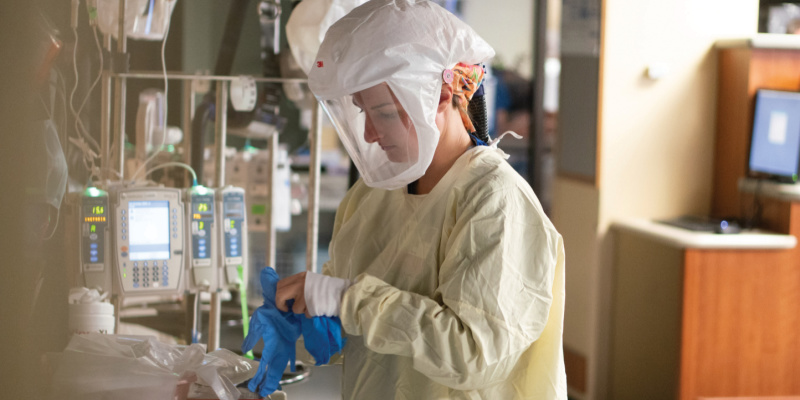By Emily McCluhan | Photo courtesy UW Health
Lona Towsley, a two-time cancer survivor from Avoca, knows what it means to dig deep and persevere during a health crisis. After bouts of cervical cancer in 1986 and 1996, Towsley had already undergone surgery and a hysterectomy. But in April 2020, lying in the ICU at UW Hospital as fluid filled her lungs and her oxygen levels dropped, Towsley began to think it might be COVID-19, and not cancer, that could take her life.
While unconscious on a ventilator for four days after her COVID diagnosis, she received a transfusion of convalescent plasma as part of a nationwide study to determine if plasma from patients who had recovered from COVID could help those with current COVID diagnoses. Towsley’s condition improved within days, and she was finally able to go home with an oxygen tank after three weeks in the ICU.
A year later, she’s thankful for the plasma transfusion that saved her life and the nurses who were her support system through her darkest days. But her life isn’t back to normal.
“I have to carry an oxygen meter everywhere, and when I start feeling bad I check my levels,” says Towsley. “That determines [if I use an] inhaler, [do] breathing exercises or use the oxygen tank.
I get so frustrated because I liked being independent [before].” Towsley suffers from what doctors and researchers call “long-COVID.” Dr. Aurora Pop-Vicas, an infectious disease specialist at the University of Wisconsin-Madison School of Medicine and Public Health, says that up to three-quarters of patients who were hospitalized with COVID-19 report at least one symptom post-discharge. These include: difficulty breathing, fatigue, loss of taste or smell, chronic pain, difficulty concentrating (also known as “brain fog”) and, in some cases, long-term organ damage.
“It’s not that surprising, because after any very severe illness — especially one that requires artificial life support — patients often have some persistent problems related to the prolonged hospitalization,” Pop-Vicas explains.
Pop-Vicas references the closest example to a severe outbreak caused by a coronavirus — the 2003 SARS epidemic — as one in which hospitalized patients also had prolonged symptoms after the initial viral infection. However, the scientific community was caught off guard in 2020 when even some COVID patients who were not hospitalized — and in some cases had only mild COVID symptoms during the acute illness — also experienced some of these prolonged effects.
“This subgroup of long-haulers … experience these symptoms, but there is still very little published research on the biological mechanisms explaining the ‘long-haul’ phenomenon,” explains Dr. Pop-Vicas.
According to the U.S. National Institute of Allergy and Infectious Diseases, 25-40% of individuals who have tested positive for COVID have experienced prolonged symptoms that can last months. Through apps like COVID Symptom Study, researchers are starting to piece together these trends and identify risk factors and causes for long-COVID.
“One of the theories for long-COVID is that there’s persistent inflammation in the body that just is not being turned off after the initial illness, and that might be responsible for some of these lingering symptoms,” Pop-Vicas says. “In most cases, this will dial down over time and the immune system will regulate back to normal.”
For example, Pop-Vicas notes that many long-haulers report loss of smell. She references a study done by Harvard neuroscientists that found that the COVID-19 virus does not attack the olfactory neurons, but rather the cells that provide metabolic and structural support to those neurons. Because the neurons can be impacted, loss of smell may occur. But the neurons are not directly damaged, so when the immune system eventually controls the virus, most patients recover their sense of smell.
“Preliminary data is also beginning to accumulate, looking at brain scans comparing images from patients with long-COVID versus patients who didn’t have COVID at all,” says Pop-Vicas, and notes that a couple of studies now have shown that there’s a consistent pattern of hypometabolism, or decreased function, in regions of the brain like the cerebellum, temporal lobe or amygdala that are known to correlate with symptoms such as loss of smell, pain syndrome or difficulty concentrating. The mechanisms for how and when these symptoms subside are still being studied, says Pop-Vicas.
This initial data helps, but without definitive knowledge yet of who is most at risk for long-COVID or the causes of it, specific immunomodulatory therapies (in other words, medications to treat it) for long- COVID are not yet available, says Pop-Vicas. Currently, patient treatment is certainly available, and relies on doctor evaluation to determine the extent of lingering symp- toms and whether there is persistent organ dysfunction to create a multidisciplinary, individualized treatment and rehab plan. In December 2020, Congress approved $1.15 billion for the National Institutes of Health to study long-COVID and its causes.
For Towsley, she experiences the uncertainty of long-COVID every day. She says when her memory fails her unexpectedly, frustration sets in and she has to step back from conversations. Instead of hustling across the rehabilitation facility she works at for disabled patients, she forces herself to delegate more to avoid the chest pain when her lungs struggle. While “the new normal” is a term we’ve all started to accept, Towsley holds onto hope that someday she’ll have a little bit of the “old normal” back.
THE COVID-19 VACCINE SCENE
As of April 5, 2021, anyone age 16 and older is eligible to get the COVID-19 vaccine, according to the Wisconsin Department of Health Services (DHS).
What does “effective” mean when it comes to these vaccines?
“We look at what a vaccine is effective against, as well as percent effectiveness,” says Dr. Nasia Safdar, medical director for control and infection prevention at UW Health. “For the COVID-19 vaccines, they are studied for effectiveness against complications that can lead to hospitalization or death. [With an] effectiveness of 95%, like that in the Moderna and Pfizer vaccines, that means that if 100 people were to get the vaccine, 95 of them would not end up getting severe COVID such that it requires hospitalization or complications that lead to death.”
If I’m still experiencing COVID-19 symptoms, will the vaccine make them worse?
DHS recommends waiting until you are recovered from the initial illness and are no longer in isolation. Researchers are starting to evaluate the effects of the vaccine on those who’ve had COVID, as well as long-haulers. According to Safdar, plausible explanations for the vaccine’s effects on long-COVID symptoms, if any, center around the possibility that the immune response triggered by the vaccine might somehow “reset” the overactive immune response that may be responsible for long-COVID symptoms.
Will I have to get the COVID-19 vaccine again in the future?
“With the way that variants of COVID-19 are spreading, it is possible that the vaccine would have to be tweaked to include that additional protection,” Safdar says. “In which case, people who have received the original vaccine will then need a booster. But it’s really too early to know for sure.”




